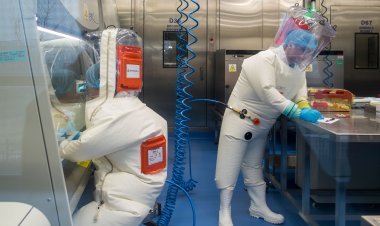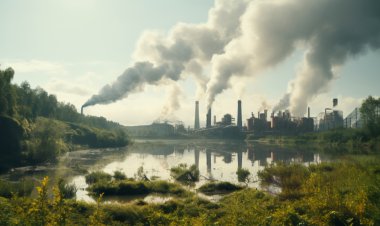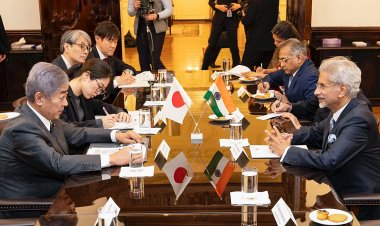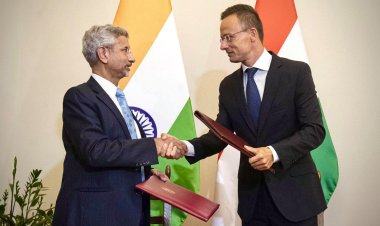COP28's Sustainable Energy and Climate Resilience Agenda
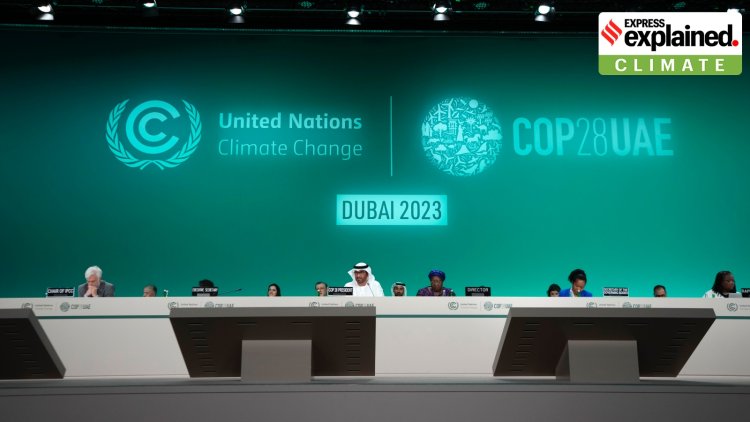
Policy Brief
By Nikita Anand
Introduction-
The 28th Conference of the Parties (COP28) is to be held in the United Arab Emirates from 30th November 2023- 12th December2023. It is a very critical platform for all global leaders to step up and deliver the promises they have made. The next ten years are crucial, and much work must be done to maintain the 1.5 target. The entire world is being negatively impacted by increasing water temperatures and sea levels. The COP28 is intended to unite people in the fight against the climate problem. UAE aims to triple renewable energy generation capacity by 2030 and double hydrogen production and use new technologies, create new jobs and skills. The use of renewable and green energy technologies must replace the usage of fossil fuels and petrol, which emit carbon. There is also a need to put special focus on least developed countries and small island nations who lack the finances to bring new technologies. This article outlines three interconnected COP28 priority areas: enhancing technology transfer, accelerating the transition to clean energy, and fostering economic unification. All of these efforts are important to bring a sustainable, equal future for the whole world.
We all live in an interconnected world where it is necessary for all the expertise from governments, academics, companies, and individuals to work together to work for the betterment of the whole world. The Climate crisis is one such thing which demands attention from the whole world, as we all are equally affected by it.
COP28 will be attended by many world leaders, CEOs, Private companies, scientists and large stakeholders. Their existence and cooperation with one another are crucial for reducing risks associated with climate change. Additionally, it will allow them to draw in new clients by showcasing their technological advancements. While it presents a business opportunity for them, they must attend COP28 in order to attract investments and stay resilient and sustainable over the long run.
There are several nations, mostly in Asia and Africa that are at high risk of experiencing excessive heat. At the same time, we see that traditional cooling contributes to greenhouse gas emissions. If not adequately controlled, the energy requirements for space cooling will triple by 2050, along with related emissions. Governments must discover natural solutions, incredibly efficient appliances, cold chains for food and vaccines; district cooling, and use National Cooling Action Plans to stop this. UAE has collaborated with UNEP and the Cool Coalition to raise awareness of this issue in order to accomplish these goals, and they look forward to presenting solutions at COP28 this year. Many nations experience these problems and lack the technology and resources necessary to resolve them. Denmark made the decision to become a Cool Champion to promote global action on sustainable cooling and bring it to the 2.5 billion people in the global south that lack access.
Many developing and impoverished nations also lack financial resources and do not receive aid from industrialized nations. They are dependent and at risk because of the lack of modern technology. Transferring green energy technologies to these nations is necessary for them to have access to the same and their chance to develop while achieving their climate goals. Leading the way in the development of clean energy technology are nations like Germany and Denmark. They have been effective in transferring knowledge and technologies to developing countries through South-South cooperation. Germany's "Renewables Academy AG" works with developing nations to provide capacity building and training on managing and integrating renewable energy sources.
India has proven its dedication to the transition to sustainable energy as a large rising economy. The nation's capacity for renewable energy has grown dramatically over time, especially in the areas of solar and wind power. By 2022, India's "National Solar Mission" aimed to have 100 GW of solar energy installed. The grid infrastructure is also being improved by "The Green Energy Corridors Project" to make it easier to integrate renewable energy sources into the national power grid.
Similar to this, industrialized and developing nations can collaborate to exchange expertise and knowledge in the transfer of sustainable energy. They can assist them in determining which technologies are appropriate for a given area and in creating sustainable energy solutions that are appropriate for that area.
Investment has also been made in technology called Direct air capture called carbon engineering. This will extract the CO2 from the atmosphere. This will help emissions to become net zero from a carbon perspective and give other companies, industries and other countries also become net zero. This technology is only available in 3 countries: Canada, Europe and the United States. This is a very costly application and is not available in many countries. These countries can come together and provide financial incentives, and subsidies and use techniques like carbon price mechanisms for the deployment of such technologies in other developing countries.
The "Climate Technology Centre and Network" of the United Nations Framework Convention on Climate Change, is hosted by UNEP. It shares knowledge and expertise with vulnerable countries facing climate challenges. The Netherlands, known for its expertise in water management and climate adaptation, has established to share its knowledge and expertise with vulnerable countries facing climate challenges. Similarly, every country should share its expertise with other countries to help them overcome the challenge. COP28 can emphasize the importance of technology transfer for climate adaptation and resilience, particularly in regions disproportionately impacted by climate change.
In order to hasten the adoption of clean energy technologies and set new, ambitious renewable energy targets, similar policies can be enacted by other nations as well. Research and development in energy-scarcity solutions must be prioritized in order to address the issue, guarantee grid stability, and provide funding to developing nations. In today's emerging and developing countries, a large portion of energy investments comes from public sources of funding. However, in order to achieve the 1.5 °C target, these economies will need to source about 60% of the funding for clean energy investment from the private sector.
There is a need for high-level dialogues between public- and private-sector energy. There should be promotion of public-private partnerships and investment in green projects, particularly in areas with potential for job creation and socio-economic development. As a large global corporation, Google has set ambitious sustainability goals. It has been carbon neutral since 2007 and aims to achieve 100% renewable energy for its global operations. COP28 can highlight the role of the private sector in the clean energy transition and encourage other companies to follow suit.
Sunita Narain, Director General, Centre for Science and Environment, Ambani is the only Indian who has been appointed to the Advisory Committee to the President of COP28. There is also a need for high- level dialogues which will bring the private and public energy sectors together. International Energy Agency ( IEA) is also working with the COP28 which will lead to tripling global renewable capacity, doubling energy efficiency progress, slashing emissions from the oil and gas industry, boosting clean energy finance for developing economies, redirecting fossil fuel investment into clean energy, and putting fossil fuel demand into sharp decline says the IEA Executive Director Dr Fatih Birol.
Even International Renewable Energy Agency (IRENA) plays a huge role in Cop 28 which believes that renewable-based energy transition are the most realistic climate solution high-level dialogues, which will play an important role in galvanizing momentum towards the energy objectives of COP28, driving actionable policies and investment decisions through a shared understanding.
All the businesses are collaborating for a sustainable future. ITU (International Telecommunication Union) is providing guidance for digital manufacturers and service providers worldwide on energy efficiency, climate change adaptation and mitigation, e-waste management and the transition to circular economies, as well as overall environmental management. It is also working closely with other global standard-making organizations, notably the International Electrotechnical Commission (IEC) and the International Organization for Standardization (ISO) to accelerate climate action. A bold policy framework known as the European Green Deal seeks to achieve carbon neutrality for the EU by 2050. By raising money to support clean energy initiatives, sustainable infrastructure, and circular economy principles, this transformational programme fosters a long-term and equitable economic transition. The Just Transition Mechanism, which guarantees that areas and sectors that are strongly dependent on fossil fuels receive support during the transition, is emphasized in the plan. Also, Costa Rica is generating 99% of its electricity from renewable resources. COP28 can recognize Costa Rica's efforts in balancing economic development with environmental preservation and inspire other nations to follow suit. China has made great progress towards a transition to sustainable energy despite being the world's top emitter of greenhouse emissions. The nation now leads the world in the use of renewable energy. China added more than 70 gigawatts of solar and wind power capacity in 2020, making up over half of all additions made worldwide. China's successes in clean energy could be highlighted at COP28, inspiring other countries to set similarly ambitious goals for renewable energy.
With its warming and depletion of natural resources, Earth has reached a dangerous point. We can see from the above examples that many countries have taken numerous steps to address the climate catastrophe, but they are still insufficient to address the problems that the entire globe is currently facing. However, one must never give up and lose hope. To do that, public-private partnerships and international cooperation are required. The COP28 can set a revolutionary agenda that shapes a sustainable and just future for the global community by giving technology transfer, the transition to renewable energy, and economic cooperation top priority as COP28 is here.
Disclaimer: This paper is the author's individual scholastic contribution and does not necessarily reflect the organization's viewpoint.
Nikita Anand is currently pursuing Masters in Diplomacy, Law and Business from OP Jindal Global University. Her interest includes Foreign policy and Public Policy.



